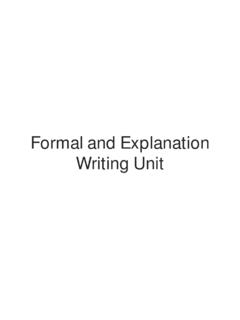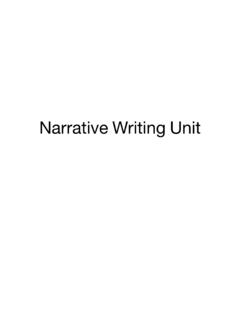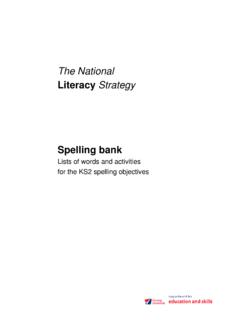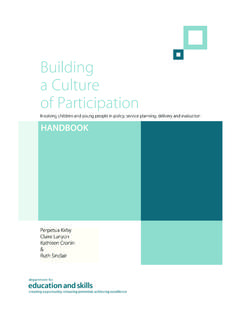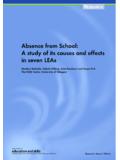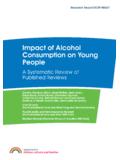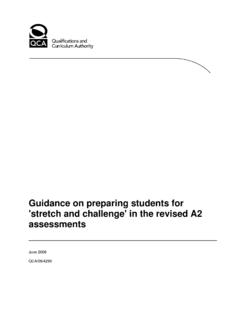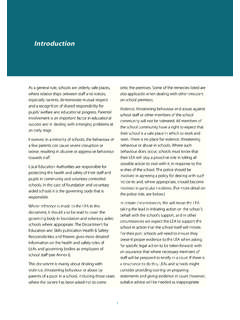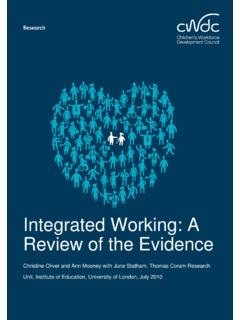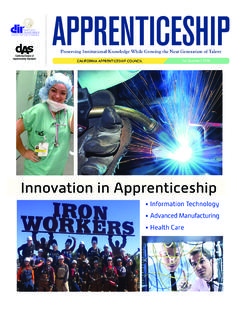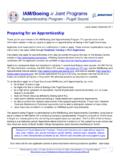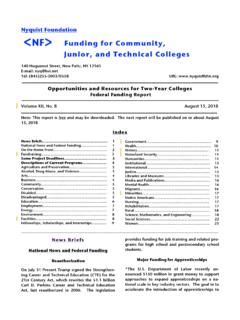Transcription of Apprenticeships for supporting teaching and learning in ...
1 Apprenticeships for supporting teaching and learning in schools Personal learning and thinking skills (PLTS) workbook Contents Page 1. Introduction 1 Purpose 1 What are PLTS? 1 PLTS mapping 3 2. Using the PLTS workbook 3 Using the PLTS workbook 3 Monitoring programmes 4 Completion form 4 3. PLTS log 4 4. Completion form 11 Annex 12 1 apprenticeship frameworks for supporting teaching and learning in schools PLTS workbook 2011 1.
2 Introduction Purpose This workbook has been produced by the Training and Development Agency for Schools (TDA) to help the learner evidence the personal learning and thinking skills (PLTS) component of the apprenticeship frameworks for supporting teaching and learning in schools. The workbook applies to apprenticeship programmes in England, where PLTS is a mandatory component. Although not formally assessed or separately certificated, evidence of completion, signed by the provider, employer and apprentice must be provided in order to obtain an apprenticeship completion certificate. What are PLTS? PLTS provide a framework for describing the qualities and skills needed for success in learning and life. The framework comprises six groups of skills that, together with the functional skills of English, mathematics and information and communication technology (ICT), are essential to success in learning , life and work. The framework captures the essential skills of managing self, managing relationships with others, and managing own learning , performance and work.
3 Each group has a focus statement which sums up the range of skills and qualities involved. The focus statement is accompanied by a set of outcome statements that describe the relevant skills, behaviours and personal qualities. The framework is as follows: Creative thinkers (CT) This is about generating and exploring ideas, making original connections. It involves trying different ways to tackle a problem, working with others to find imaginative solutions and outcomes that are of value. Learners will demonstrate the following: CT 1 - generate ideas and explore possibilities CT 2 - ask questions to extend their thinking CT 3 - connect their own and others ideas and experiences in inventive ways CT 4 - question their own and others assumptions CT 5 - try out alternatives or new solutions and follow ideas through CT 6 - adapt ideas as circumstances change Independent enquirers (IE) This is about processing and evaluating information in investigations, planning what to do and how to go about it.
4 It is about making informed and well-reasoned decisions, recognising that others have different beliefs and attitudes. Learners will demonstrate the following: IE 1 - identify questions to answer and problems to resolve IE 2 - plan and carry out research, appreciating the consequences of decisions IE 3 - explore issues, events or problems from different perspectives IE 4 - analyse and evaluate information, judging its relevance and value IE 5 - consider the influence of circumstances, beliefs and feelings on decisions and events IE 6 - support conclusions, using reasoned arguments and evidence 2 apprenticeship frameworks for supporting teaching and learning in schools PLTS workbook 2011 Team workers (TW) Learners work confidently with others, adapting to different contexts and taking responsibility for their own part. They listen to and take account of different views. They form collaborative relationships, resolving issues to reach agreed outcomes.
5 Learners will demonstrate the following: TW 1 - collaborate with others to work towards common goals TW 2 - reach agreements, managing discussions to achieve results TW 3 - adapt behaviour to suit different roles and situations, including leadership roles TW 4 - show fairness and consideration to others TW 5 - take responsibility, showing confidence in themselves and their contribution TW 6 - provide constructive support and feedback to others Reflective learners (RL) This is about the learner evaluating their own strengths and limitations, setting realistic goals with criteria for success. It involves monitoring their own performance and progress, inviting feedback from others and making changes to further their learning . Learners will demonstrate the following: RL 1 - assess themselves and others, identifying opportunities and achievements RL 2 - set goals with success criteria for their development and work RL 3 - review progress, acting on the outcomes RL 4 - invite feedback and deal positively with praise, setbacks and criticism RL 5 - evaluate experiences and learning to inform future progress RL 6 - communicate their learning in relevant ways for different audiences Self managers (SM) This is about learners organising themselves, showing personal responsibility, initiative, creativity and enterprise with a commitment to learning and self-improvement.
6 They actively embrace change, responding positively to new priorities, coping with challenges and looking for opportunities. Learners will demonstrate the following: SM 1 - seek out challenges or new responsibilities and show flexibility when priorities change SM 2 - work towards goals, showing initiative, commitment and perseverance SM 3 - organise time and resources, prioritising actions SM 4 - anticipate, take and manage risks SM 5 - deal with competing pressures, including personal and work-related demands SM 6 - respond positively to change, seeking advice and support when needed SM 7 - manage their emotions, and build and maintain relationships 3 apprenticeship frameworks for supporting teaching and learning in schools PLTS workbook 2011 The PLTS groups are interconnected so it is likely that apprentices will encounter skills from several groups in any one learning experience. For example, when an apprentice works to improve their own and team practice in schools they will have demonstrated team worker (collaborate with others to work towards common goals), effective participator (identify improvements that would benefit others as well as themselves) and self manager skills (work towards goals, showing initiative, commitment and perseverance).
7 PLTS mapping To support delivery, the focus statements of each PLTS group have been mapped to the mandatory units of the Level 2 Certificate in supporting teaching and learning in Schools and the Level 3 Diploma in Specialist Support for teaching and learning in Schools. The mapping is a starting point, a guide where at least some PLTS outcomes can be demonstrated, and is not exhaustive. The mapping needs to be supported by the use of this workbook. Some of the assessment criteria in the Qualifications and Credit Framework (QCF) units have been mapped against the outcome statements identified in the six PLTS groups. The mapping can be found in annexes A and B. 2. Using the PLTS workbook Using the workbook The workbook is designed to help providers, employers and apprentices ensure that PLTS within apprenticeship programmes for supporting teaching and learning in schools are achieved. The workbook can be tailored to meet your requirements so long as all aspects are covered by the learner.
8 The apprentice, assessor and employer will need to complete the PLTS log identifying how and when each of the PLTS outcomes have been demonstrated. It is anticipated that apprentices will complete the log during the course of their apprenticeship . Effective participators (EP) This is about learners actively engaging with issues that affect them and those around them. They play a full part in the life of their workplace or wider community by taking responsible action to bring improvements for others as well as themselves. Learners will demonstrate the following: EP 1 - discuss issues of concern, seeking resolution where needed EP 2 - present a persuasive case for action EP 3 - propose practical ways forward, breaking these down into manageable steps EP 4 - identify improvements that would benefit others as well as themselves EP 5 - try to influence others, negotiating and balancing diverse views to reach workable solutions EP 6 - act as an advocate for views and beliefs that may differ from their own 4 apprenticeship frameworks for supporting teaching and learning in schools PLTS workbook 2011 Monitoring programmes The provider should ensure that employers and any other people involved in the delivery of PLTS are provided with a copy of the agreed programme.
9 It is also important to ensure mutual understanding, including apprentices, of the PLTS outcomes and to check this at regular intervals. As a signatory to the PLTS completion form, it is essential that apprentices are given a copy of the agreed PLTS programme in order to monitor and agree satisfactory completion and achievement of the learning outcomes. As stated above, PLTS are a mandatory component of apprenticeship frameworks. However, there is no requirement for formal assessment. It is the responsibility of the provider and employer to ensure that all aspects of the specified content have been covered. Regular reviews with learners, involving both the provider and the employer, should be carried out to measure progress towards achievement of the PLTS outcomes. Completion form Evidence that PLTS have been covered within the apprenticeship programme must be sent with the apprenticeship certification request. A form is provided at the end of this workbook for this purpose.
10 The form must be signed and dated by the provider, employer and the apprentice to confirm that all aspects of PLTS have been covered. (Please note that the PLTS programme itself is not required to be separately certificated.) 3. PLTS log The apprentice, assessor and employer will need to complete the PLTS log identifying how and when each of the PLTS outcomes have been demonstrated. 5 apprenticeship frameworks for supporting teaching and learning in schools PLTS workbook 2011 PLTS Log Name: .. Intermediate/Advanced Level apprenticeship in supporting teaching and learning in schools (delete as appropriate) Independent enquirer Independent enquirer Evidence of how and when this skill was demonstrated Assessor/employer comments Identify questions to answer and problems to resolve Plan and carry out research, appreciating the consequences of decisions Explore issues, events or problems from different perspectives Analyse and evaluate information, judging its relevance and value Consider the influence of circumstances, beliefs and feelings on decisions and events Support conclusions, using reasoned arguments and evidence 6 apprenticeship frameworks for supporting teaching and learning in schools PLTS workbook 2011 PLTS Log Name.
